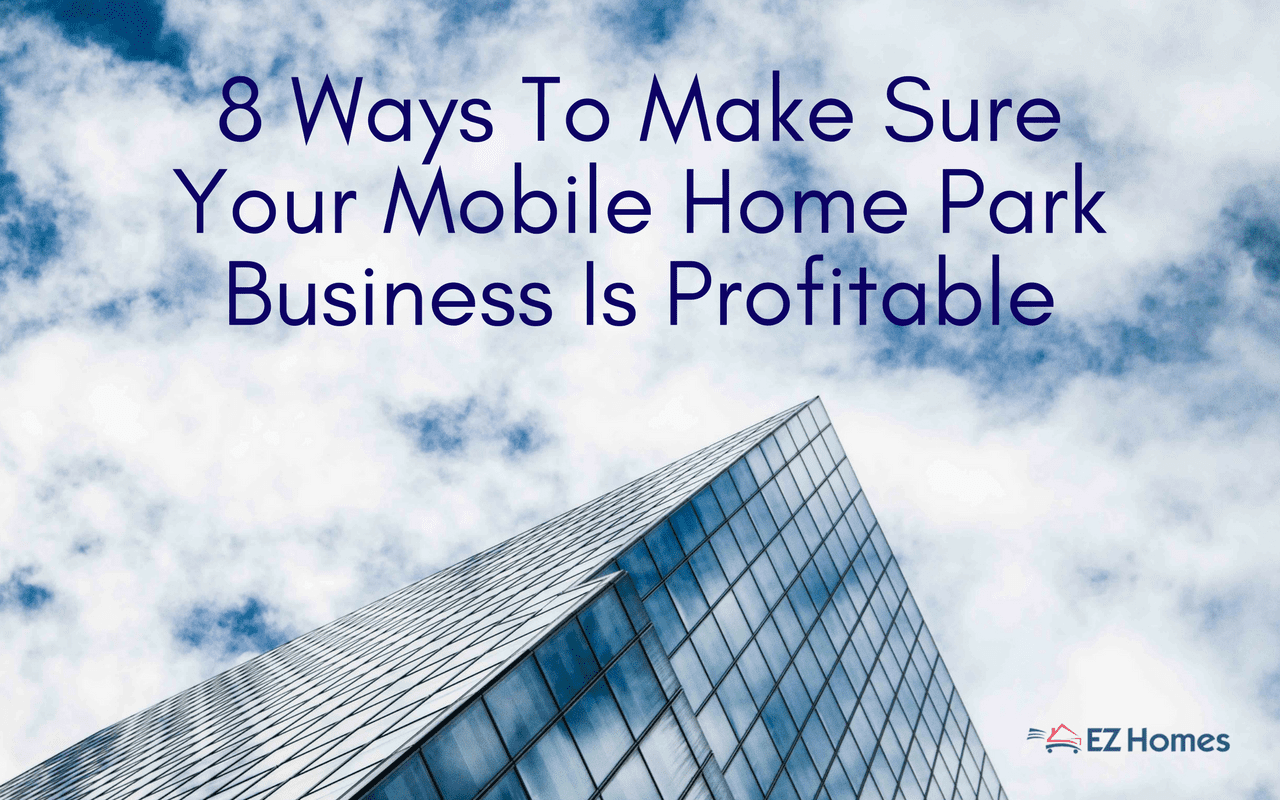Running a mobile home park business is not an easy job. On a day-to-day basis, you are probably swamped with tasks. Unfortunately, this usually means you don’t find time to attend to one of the most important ones. Keeping your park profitable. However, without profits, eventually, there will be no park.

No matter how committed you are to maintaining a fantastic community for your tenants, you need to keep your own head above water too. In this article, we want to give you some tips to keep the financial side of your park running smoothly. There are a lot of simple things you can already start rectifying today that will make a big difference in the long run.
Ensure that you charge a decent amount of rent
Sadly, many mobile home park owners massively undercut themselves when it comes to the amount of rent they charge. This is especially true of typical mom-and-pop park owners who have had their parks for decades. On average, they usually don’t have any real estate background and don’t view their park as a business. Instead, it is a way of life. Eventually, the financial load becomes too much to bear.
There are plenty of stories online of people who have made their own success stories out of parks like these. They waited until they found a park with ridiculously low lot rent. Without making any upgrades, many of these new owners were able to triple the amount of rent right away. And here’s the shocking part. They almost never lost a single resident.
If you recently bought a mobile home park, you will definitely want to review the current rent and make sure it’s up to date. To do this, you will need to find out what is considered a fair amount. That’s much easier to do than you might think.
First of all, rental prices vary dramatically from state to state. Mobile home park rental tends to follow the trend of real estate in this regard. California, for example, is one of the highest cost states in terms of housing. Lot rent here can easily reach or exceed $600. However, in other states, such as South Carolina, housing costs are much lower and lot rent can be as low as $200.
Find an acceptable range for your state by looking at what other parks cost. After that, set your own price based on the status of your park, the rent of competing parks, and what you would like to charge.
Make sure you update your rent on a yearly basis
It might seem like we just talked about this, however, this is a different factor altogether that’s also often neglected by mobile home park owners. Unfortunately, we have to deal with a little thing called inflation. Inflation is about as sure and unavoidable part of life as death and taxes.
Because of inflation, most costs increase on a yearly basis. That means that it will cost more every year to do the exact same maintenance or services, pay the same bills, and buy the same items. These expenses directly affect your bottom line as a mobile home park owner.
Landlords or owners of residential property generally increase their rent every year to account for inflation. On average, increasing the rent by 10% year is adequate to cover rising costs and still be fair to your residents.
However, you can’t just change the rent whenever you want. The lease agreement guarantees the agreed amount for its term. For a tenant on a 1-year lease, you still need to give 3-months notice if rent will go up once the lease renews. If your tenant is on a month-to-month lease agreement, you can also increase the rent after 3-months notice at any time.
For tenants on a longer lease, you can increase the rent at any time as long as you’ve given 3-months notice. However, you have to consult the tenants. Tenants will usually seek a guarantee of at least a year without any increases before they sign.
This means you need to keep careful track of your individual tenant’s lease agreements. When they run out, you can make sure your rental increase covers every tenant and that you inform them in time.
Maintain a high occupancy rate

This is another fairly obvious rule, which applies straightforward math. The more occupants you have, the more rent you collect every month. And the more money you make. Any landlord wants to run at as high occupancy as possible, but it doesn’t come easily. Here are some things you can do to keep your’s high.
– Advertise your mobile home park
You will need to constantly keep advertising your mobile home park. Luckily, there are many platforms for you to do is. The best place to start is by advertising your mobile home park online on listing websites. On these websites, you can advertise your park as a whole, individual lots or individual mobile homes. MHVillage, MHBay, and Mobile Homes For Rent are some of the most popular options.
Also, strike up relationships with local real estate agents. They might just throw some business your way if someone that can’t afford a stick-built home comes along. Advertise in your local papers and put up advertising signs along roads nearby your park.
– Be flexible when it comes to lease agreements
The same shoe won’t fit everyone, and the same goes for lease agreements. Many different types of people from different walks of life live in mobile homes for different reasons. You want to make sure that you cater for as many of them as possible (and within reason).
There are three types of lease agreements that are common in mobile home parks:
- 1-year lease agreement
- Long-term lease agreement
- Month-to-month lease agreement
Depending on your park and your own preferences you might also want to offer different ways to be a resident of the park:
- Only rent out lots and residents bring their own homes.
- Rent out lots with park-owned mobile homes on them.
- Sell mobile homes and charge lot rent.
Be serious when it comes to numbers
Number crunching is no one’s favorite past time. However, when it comes to a business like a mobile home park that has so many potential sources of income and expenses, it’s absolutely crucial.
You should have already seen the importance of keeping track of your rental income from the previous three rules. Apply that same importance when it comes to keeping track of your expenses. In the end, it could be plugging these small areas where money leaks through that keep you afloat.
You also won’t know where you have to improve or what issues you need to address if you can’t identify problems and back it up with numbers. This way, you also know exactly what effect your solution had.
Schedule regular maintenance

Being neglectful when it comes to maintenance is another one of those pet peeves that too many mobile home park owners indulge. Especially when their financial situation is tight.
However, it’s important to realize that skimping on a much-needed upgrade or repair now, might cost you a lot more in the long run or at a later point in time. To take an extreme example, you almost can’t compare the cost of installing a few thousand dollars of fire retardant insulation with the damages if a fire actually broke out and consumed multiple homes.
When it comes to maintenance and service, it’s better to be safe than sorry. Mobile homes need a lot of TLC. If you simply don’t have the energy or the drive to take care of small maintenance issues yourself, put it in writing that residents are responsible for it themselves, but be prepared to ask for less in rent.
Regular maintenance is not only needed for the homes themselves, the park itself also needs it from time to time. You should know what’s going on with your utility’s infrastructure, such as your water supply and electricity and be prepared to handle any problems. Issues with these can also lead to much greater problems later on.
Maintain high standards throughout your mobile home park
Another obvious rule, but one that often gets swept under the rug in the pursuit of trying to cut costs. Cutting costs only goes so far, but actually creating a park where residents are proud to live in, people can’t wait to move in to, and people don’t want to move out of can go a whole lot further.
We just talked about maintenance, which is obviously a very important aspect. People don’t want to live in a rundown park where the homes look as if they are going to fall apart, utilities are reliable, and there is a general sense of not caring.
You should also carefully consider to which financial class of people you want to appeal to. If you want to create a higher end mobile park, you might need to either completely replace some of the existing homes or create standards for which models of homes are acceptable. You may need to implement both ideas.
A good place to start would be to ensure that all the mobile homes in your park adhere to the HUD code and are built after a certain date. 1989 is a popular cutoff date because important amendments to the HUD code were made just prior to it. Newer homes also tend to look better and curb appeal is an important factor when attracting new tenants and determining the cost of living in your park.
You can even make reasonable demands in the lease agreement that specifies in what condition homes should be kept. This can extend to the exterior of the home and the landscape. For example, you can specify that homes follow only a certain color scheme or style.
Screen new tenants thoroughly
We want to warn you right from the start, whatever screening you put potential tenants through, you need to be very careful not to overstep the boundaries and perpetrate discrimination. There are laws in place that protect potential tenants from being disqualified based on discriminatory methods. Make sure you’re familiar with them.
That being said, you still have power over who can stay in your mobile home park. You will definitely meet with the tenant at some point and you should use this time to carefully form an impression of them.
If they have given you any cause for concern you can check their credit history, contact previous landlords or income to verify if they are likely to keep paying rent and are reliable people.
You are only allowed to take financial and criminal history into account and may not form a decision based on race, disability or the fact that they have children. However, if you can prove that you have reason to doubt their ability, or willingness, to consistently pay rent, you have a right to refuse them.
Ask mobile home residents for help
Generally speaking, mobile home residents are a productive and hands-on bunch. You would be surprised how many community members are willing to pitch in and help make big improvements to the park a reality.
Hopefully, you do have community meetings. These are a great platform to raise issues and concerns. They are also a great way for you to come to your residents with ideas and ask for help.

Residents will be especially willing to help if they’re coming off years living under a complacent management. Tell them what improvements you want to make to the park and be open to any kinds of help. It could be in the form of physical labor, financial aid or just providing you with contacts that can get it done for cheaper.
If it’s truly for the good of the community, many residents wouldn’t mind pitching in.
Make your mobile home park business successful this year!
That’s it! Following these guidelines, you will have your mobile home park business running smoothly in no time. It’s important to form a proper habit of taking care of these tasks until it is just another everyday part of you running your mobile home park.


